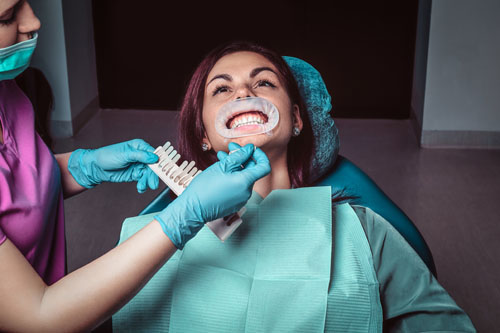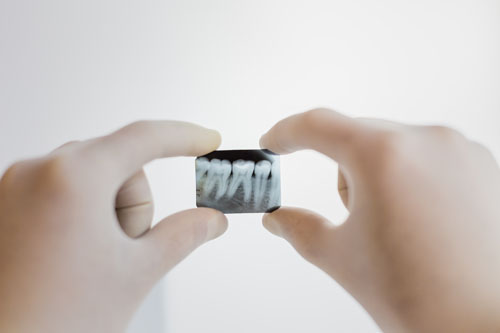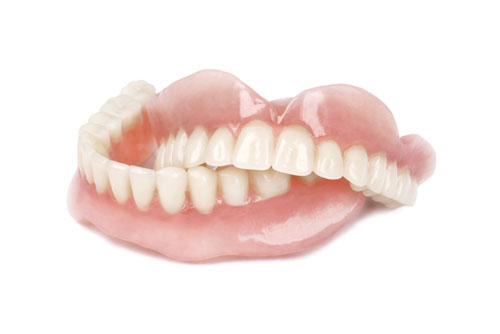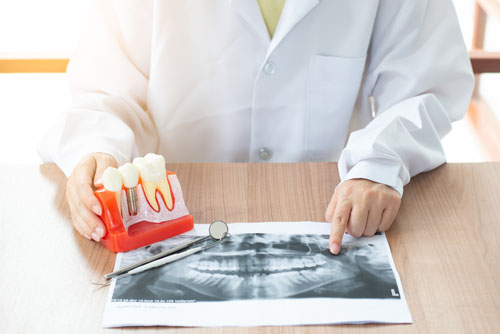Dental Crowns
A dental crown is a prosthetic/artificial piece that fits over a natural tooth after it has been restored or repaired. Some people refer to crowns as caps because they fit your tooth like a cap fits your head. Therefore the remaining natural tooth is enclosed and protected from fracture. Crowns can strengthen the natural tooth while also giving you an aesthetic restoration, which can restore a smile. Whether the tooth has undergone some type of trauma or it has been repaired with a root canal, it will need to be protected from any additional decay or damage.
Crowns can provide a wholly natural look, while also giving you much-improved strength. They are a great option to restore your smile.

What is a dental crown?
A dental crown is a prosthetic restoration that is custom-fit to cap a natural tooth that is in need of protection or strengthening. Whether it’s a front tooth crown or perhaps a molar, the tooth cap will offer a natural look and feel once it has been bonded in place. With good home care, it will also protect the restored tooth from any further damage or decay. It will also ensure that your bite remains and functions as always.
Crowns can stabilise teeth that have been damaged or repaired, but they can also work well as a cosmetic solution especially where teeth have unsightly old fillings or have been seriously discoloured.
Crowns are milled, or made, using numerous materials. The most common are acrylic, composite, porcelain or metal alloys. They can be made to perfectly mimic the colour and vitality of your teeth. This will give you a natural look that you are after.
Alloys are more durable and offer added strength overusing porcelain alone, so these types of crowns are often used for back teeth. The porcelain bonded to metal option in dental crowns can create long-lasting and aesthetically-pleasing results combining the best of both materials.
When you meet with your dentist to discuss your goals for restoring your smile, you’ll be able to discuss which of the options in crowns is the best choice to help you to meet your oral health care goals.
Getting a crown on a tooth protects and reinforces weakened teeth from breaking or cracking.
Have you undergone a tooth repair procedure for a broken tooth? Have you had multiple repairs of the same tooth? Have you lots of old fillings with one of them constantly out? Repairing cracked or chipped teeth with a filling can help to protect them against decay but this repair alone will not add strength to a tooth. A crown or tooth cap can offer that protection for the tooth and also restore functionality to the tooth. Teeth that have undergone root canal therapy often need to have a protective crown placed as the tooth tends to be a little more brittle and has had even more tooth removed for the root canal access.
When you work with your dentist to discuss your oral health goals, you will be able to determine which crown will be the best option to meet your needs.
Porcelain and porcelain fused to metal are two of the options for crowns. Porcelain can provide the natural look that you are after, while the porcelain fused to metal option can give the tooth added durability. The option that will work best for you will be based largely on the reason that you need a dental crown, is it for cosmetic or tooth restoration reasons? The intended location of the crown will also factor into it, as molars often need the added durability that porcelain fused to metal can offer.
Only a healthy tooth can be fitted with a crown. If there is any gum damage or signs of decay on the tooth, these will need to be addressed.
Once the tooth is treated and ready for the crown, an impression will be taken so that we can make a perfectly fitting crown. The impression will be sent to the laboratory that will create the crown. We only work with the most talented laboratories that have been consistently producing excellent work for us for years.
Your dentist will fit the tooth with a temporary crown so that it will be protected until the permanent crown is ready. When the permanent crown is ready to fit, you’ll return to the clinic for the placement- about two weeks later usually. Your dentist will make any minor adjustments that are needed in order to ensure you get a comfortable fit and a natural bite. The crown will then be permanently affixed to the tooth.
Any tooth that has undergone large or repeated restoration or is in need of extra protection should be fitted with a crown. Failing to do so will put the tooth at a high risk of decay or additional damage.
Crowns can offer protection for the tooth, restore a bite that may have been off and can also restore your confidence in your smile.
Where several large fillings are adjacent to one another the limitations of filling material can mean gaps are left between the teeth causing annoying food traps. Longterm this is damaging to both teeth either side of the trap. Crown material is stronger so can be built out more to close the food trap. The contact with the adjacent teeth is a high priority for us.
Crowns are also an option for resolving a number of cosmetic issues. Because they are strong they can be used to build out teeth that are crooked and chipped. This makes the teeth appear straight and even and any shade of white required. They would generally be used for teeth that have been filled significantly previously or are in high-stress areas. Otherwise, veneers would be preferable.

How much do crowns cost?
At Cork City Dentist we are aware that it can often be the unknown costs of treatment that can keep patients from getting the treatment that they need. We provide our patients with clear and upfront competitive pricing.
Knowing what to expect can help patients to make the right informed decision about the treatments that are needed. To learn more about getting a crown or other dental treatments you are in need of, book your appointment online or call 0214501306.
| Treatment | Price |
|---|---|
| Tooth whitening | €300 |
| Crowns (dependant on type) | from €700 |
| Porcelain veneers | from €700 |
| Dental Bridges | €700 per unit |
| Inlays & Onlays | from €500 |
| Dentures - Partial acrylic (plastic) | €550 - €650 |
| Dentures - Partial cobalt (metal base) | €1400 |
| Dentures - Full upper | €550 |
| Dentures - Full upper and lower | €1200 |
| Dental Implants - Crown | €1200 (+specialist fee for surgical treatment) |
Getting the beautiful smile that you deserve begins with a consultation with your dentist.
Crowns can protect treated or cracked teeth and can also ensure your smile looks wonderfully natural. Book your consultation online or call our clinic at 0214501306.
Other Treatments
Contact Us
Other Treatments you may consider

Tooth Whitening
Do you feel dissatisfied with the colour of your teeth? Are your teeth a yellow or dull grey colour? A bright white smile is one of the easiest ways that you can boost your confidence and improve your appearance. Don’t allow off-coloured or stained teeth control your confidence levels.

Dental Veneers
Preventing small dental issues from flaring up into much more severe health problems is possible when you maintain a good check-up routine with our dentist. Both a check-up and consultation for additional dental services and treatments can help you to ensure proper oral health.

Composite Bonding
Bonding consists in the application of composite resin on dental surfaces to repair decayed, chipped or misaligned teeth. Composite resin has the advantage of being aesthetic, reasonably priced and very mouldable.. It is shaped and polished according to the characteristics of the surrounding teeth.

Dental Inlays and onlays
With the exception of a tooth that is need of root canal therapy, the majority of tooth restorations can be completed using a simple filling. A tooth that has decay or damage too extensive for a simple filling, but not in need of a root canal or crown, may be restored with an inlay or onlay to recreate both the aesthetics and functionality.

Tooth Replacement Guide
Compare the options and reasons for replacing missing teeth at Cork City Dentist. We offer implants, dentures and bridges. Book online or call 0214501306. It can be quite unsettling when someone loses one or more teeth, but with the advancements in dental technology, today we have more tooth replacement options than ever before.

Dentures & False Teeth
Tooth loss can lead to several concerns, including a marked impact on the ability to speak clearly, along with issues of self-esteem and confidence. The loss of one or more teeth can result in bone-regression in the jaw bone and over-closing which can, in turn, lead to the signs of premature ageing.

Dental Bridges
Simply put, a dental bridge will bridge the gap that was created by the missing tooth or teeth. The bridge will be fixed to the healthy teeth on either side of the gap. These teeth may need to be capped with a crown to reinforce them or can just have a ‘wing’ of bridge material on the palate or tongue facing side.

Dental Implants
Advances in dental care mean that more people are expected to retain their natural teeth for longer. There are, however, many who are currently missing teeth in their upper and lower jaws. Whether you have lost one or more teeth as the result of decay or injury, gaps between your otherwise healthy teeth can lead to several oral health concerns.
Frequently Asked Questions about Dental Crowns
A lot of people call dental crowns ‘caps’ because they fit your tooth like a cap will fit your head. Crowns are mostly designed to make your tooth stronger physically however they have the happy side effect of being very aesthetic. A problem a lot of people run into is that having had their tooth filled repeatedly there is very little tooth left and fillings may be falling out regularly. Equally large white fillings at the front of your mouth may chip and become unaesthetic. In these cases, a crown or indeed several crowns may be the answer.
Dental crowns may be made from acrylic (usually temporary), composite, metal or porcelain- sometimes in combination with each other. Previously gold was used regularly for crowns on back teeth. However, it has fallen out of favour despite being a fabulous dental material. Most permanent crowns are now made from porcelain or porcelain with a metal sub-layer (usually a combination of precious metals).
Dental crowns are permanently fixed to the teeth and a good one may last twenty years. This would very much depend on the amount of tooth left in the first place with at least 2mm of tooth remaining above the gum required ideally all around the tooth. Also, the crown will last longer if it is not too heavily loaded. People who grind their teeth should wear a nightguard to protect their own teeth and the crown. Finally, care should be taken not to get decay on the crowned tooth as filling it may destroy the crown and sports shields are essential in a contact sport.
Tooth crowns are a marriage between the extremely accurate- down to .3mm- preparation of the tooth by your dentist and the work of a talented laboratory technician. The work is exacting and demanding. Dental crowns vary in price depending on the material. A composite crown may cost 200 euro per tooth whilst the most aesthetic porcelains such as empress or Procera may cost 850 euro. The crown we find that we use most often is porcelain fused to zirconia which costs 700 euro per tooth. Crown and bridgework are tax-deductible and 20% will be refunded by revenue.
Meet The Team
We have a Fantastic group of highly trained, friendly dental staff to ensure you get the best treatment in Cork.
Get in Touch with us Today
Please call or email us via the contact form and we respond to you as soon as possible.
Contact Info
Phone: (021) 450 1306 / (021) 450 1250
Email: [email protected]





